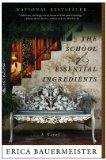Summary | Excerpt | Reading Guide | Reviews | Beyond the Book | Readalikes | Genres & Themes | Author Bio

“Would you like to try?” she asked.
Not where is your mother, not how old are you, but would
you like to try. Lillian looked up and smiled.
The woman reached into the case and pulled out an oblong
yellow shape.
“Tamale,” she said, and handed it on a small paper plate to
Lillian.
The outside was soft and slightly crunchy, the inside a festival
of meat, onions, tomatoes, and something that seemed
vaguely like cinnamon.
“You understand food,” the woman commented, nodding,
as she watched Lillian eat.
Lillian looked up again, and felt herself folded into the
woman’s smile.
“The children call me Abuelita,” she said. “I think I hear
your mother coming.”
Lillian listened, and heard the sound of her mother’s reading
voice winding its way down the alley. She cast her eyes around
the store once more, and noticed an odd wooden object hanging
from a hook on one of the shelves.
“What is that?” she asked, pointing.
“What do you think?” Abuelita took it down and handed
it to Lillian, who looked at its irregular shape — a six-inch-long
stick with a rounded bulb on one end with ridges carved into it
like furrows in a field.
“I think it is a magic wand,” Lillian responded.
“Perhaps,” said Abuelita. “Perhaps you should keep it, just
in case.”
Lillian took the wand and slid it into her coat pocket like a
spy palming a secret missive.
“Come back anytime, little cook,” Abuelita said.
Lillian had returned to the store often over the years. Abuelita
had taught her about spices and foods she never encountered
in Elizabeth’s or Margaret’s houses. There was avocado, wrinkled
and grumpy on the outside, green spring within, creamy
as ice cream when smashed into guacamole. There were the
smoky flavors of chipotle peppers and the sharp-sweet crunch of
cilantro, which Lillian loved so much Abuelita would always
give her a sprig to eat as she walked home. Abuelita didn’t talk
a lot, but when she did, it was conversation.
So when Lillian walked into the store, a week after making
mashed potatoes for her mother, Abuelita looked at her closely
for a moment.
“You are missing something,” she noted after a moment.
“It didn’t work,” Lillian replied, despairingly. “I thought I
had her, but it didn’t work.”
“Tell me,” said Abuelita simply, and Lillian did, about
cookies and spices and Henry James and mashed potatoes and
her feeling that perhaps, in the end, food would not be the magic
that would wake her mother from her long, literary sleep, that
perhaps in the end, sleep was all there was for her mother.
After Lillian ended her story, Abuelita was quiet for a while.
“It’s not that what you did was wrong; it’s just that you aren’t
finished.”
“What else am I supposed to do?”
“Lillian, each person’s heart breaks in its own way. Every
cure will be different — but there are some things we all need.
Before anything else, we need to feel safe. You did that for her.”
“So why is she still gone?”
“Because to be a part of this world, we need more than
safety. Your mother needs to remember what she lost and want
it again.
“I have an idea,” Abuelita said. “This may take a few
minutes.”
Abuelita handed Lillian a warm corn tortilla and motioned
for her to sit at the small round table that stood next to the front
door. As Lillian watched, Abuelita tore off the back panel from
a small brown paper bag and wrote on it, her forehead furrowing
in concentration.
“I am not a writer,” she commented as she finished. “I never
thought it was worth much. But you will get the idea.”
She put down the paper, picked up another small grocery
bag, and began gathering items off the store shelves, her back
to Lillian. Then she folded the paper, placed it in the top of the
bag, and held the bag out to Lillian.
From the prologue to The School of Essential Ingredients by Erica Bauermeister. Copyright Erica Bauermeister 2009. All rights reserved. No part of this book maybe reproduced without written permission from the publisher.
Your guide toexceptional books
BookBrowse seeks out and recommends the best in contemporary fiction and nonfiction—books that not only engage and entertain but also deepen our understanding of ourselves and the world around us.